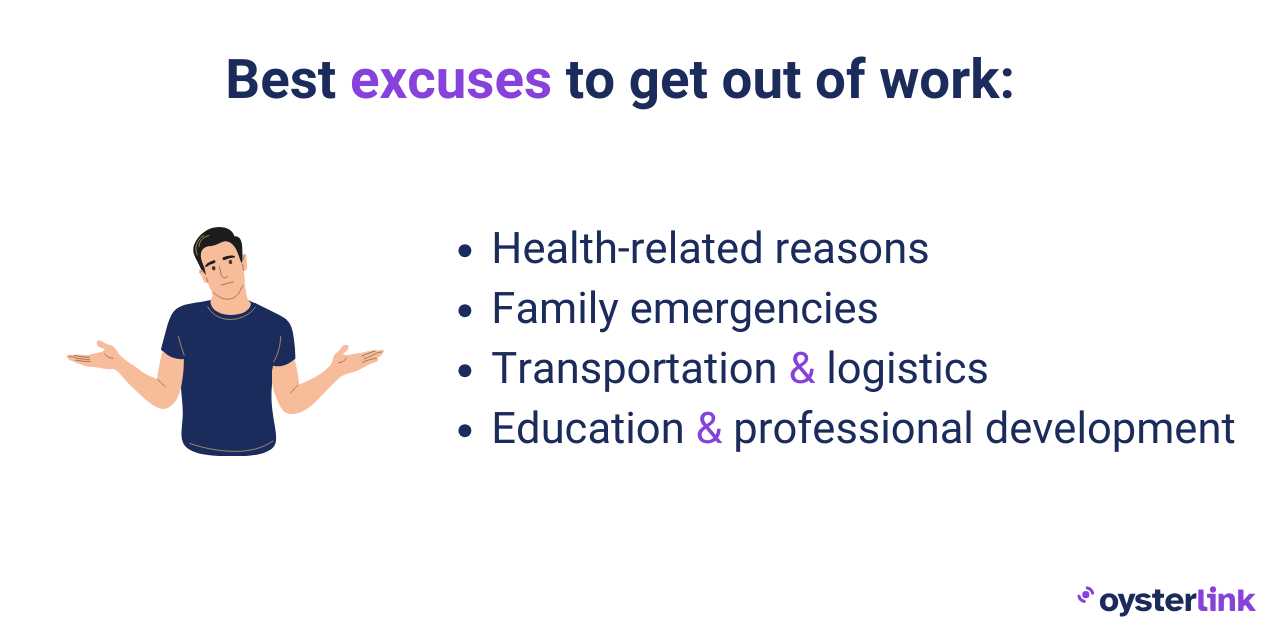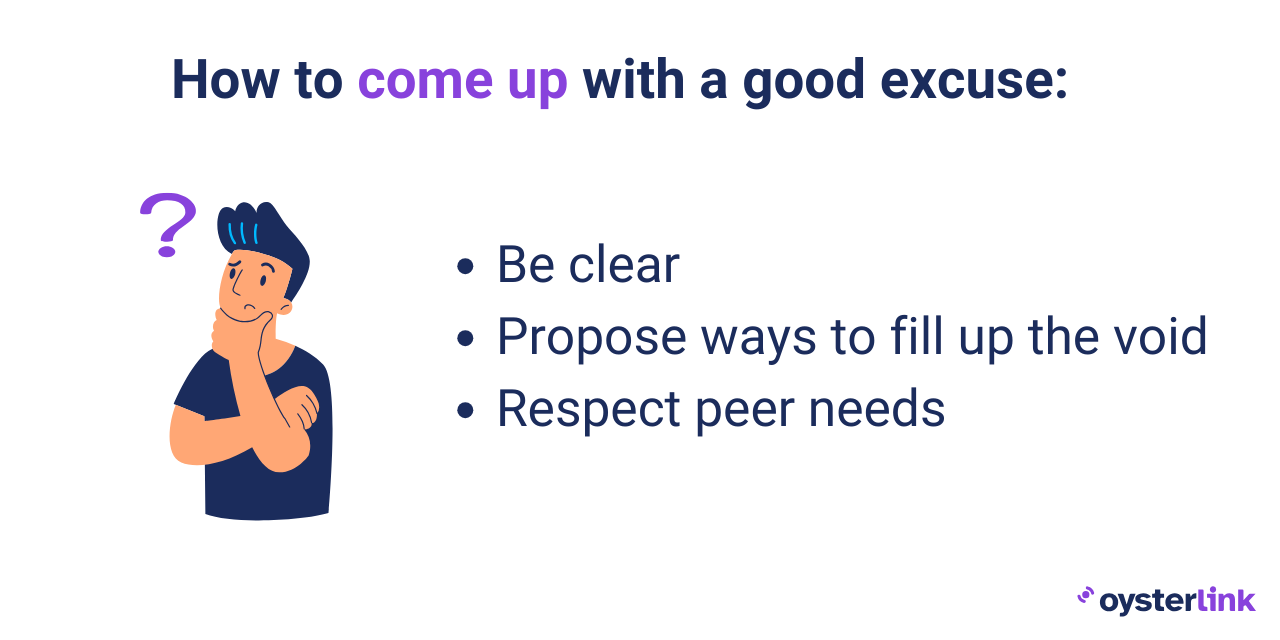We’ve all been there: unexpected events, unforeseen circumstances, or perhaps just a day when you genuinely need a mental health break.
Here at OysterLink, we’re all about fostering environments that understand and value human needs. Because, after all, at the heart of every professional is a human being navigating the waves of both the professional and personal world.
But how do you go about asking for that time off with integrity and foresight, especially when making a last-minute excuse to get out of work?
Today, we’ll share the best excuses to get out of work, to help you approach the situation with as much integrity as possible to keep your professional relationships intact.
10 Best Excuses To Get Out of Work
Whether you’re a server, a pastry chef, or a kitchen manager, there will inevitably be times when unexpected events or challenges arise, making it difficult to attend work. While honesty is always the best policy, here are some genuine reasons that might require you to take a day off.

Health-Related Reasons
- Sickness: “I woke up with a fever and flu-like symptoms. It’s best for everyone if I don’t come in and risk spreading it.”
- Medical appointment: “I have a last-minute doctor/dentist appointment. It was the only slot available for the next few months.”
- Injury: “I sprained my ankle and can barely walk. I wouldn’t be able to perform my duties efficiently.”
Family Emergencies
- Childcare issue: “My babysitter canceled last minute, and I can’t find a replacement for today.”
- Family illness: “My [family member] is quite ill, and I need to be there for them.”
- Family event: “There’s a once-in-a-lifetime family event I must attend. I forgot to request it off in advance.”
Transportation and Logistics
- Car trouble: “My car broke down this morning, and I’m waiting for a tow. I don’t think I’ll make it to my shift on time.”
- Public transport delay: “There’s a major delay on [specific line/bus route]. I won’t make it in time, and alternative routes are just as congested.”
Education and Professional Development
- Class/exam overlap: “I have a class/exam that was rescheduled to today. I’ll need to miss my shift.”
- Training/workshop: “There’s a workshop related to [a skill beneficial to the restaurant or your education] today. Attending it could help me bring more value to our team.”
While all these examples should work well if they relate to your situation, you may have to craft an excuse on your own if none of these apply to you. We will discuss how to create a good excuse to get out of work below.
How To Craft a Good Excuse to Get Out of Work
Crafting a good excuse is about more than just finding a believable reason; it’s about framing it in a way that upholds your integrity and respects the demands of the workplace.
Crafting the right excuse to get out of work isn’t about deception; it’s about conveying your genuine reasons with tact and consideration for the demands of the workplace.
By approaching the situation with empathy and understanding, you can ensure your time off is both warranted and well-received.

Be Clear, But Not Overly Detailed
While you need to provide a reason, diving into extreme details might not always be necessary. A succinct explanation that offers enough context without over-elaboration is the key.
Think, “I have a personal matter to attend to,” rather than a long-winded story.
Offer To Mitigate Potential Disruptions
If possible, propose ways to reduce the impact of your absence. Can a colleague step in? Can you work on something in advance?
Showing that you’ve considered the consequences and are proactive about solutions will be appreciated, especially when making an excuse to get out of work last minute.
Avoid Potential Pitfalls
While seeking time off might be essential in your scenario, there are certain pitfalls to be wary of. Let’s delve into some of these:
- Repeatedly asking off for last-minute requests: While emergencies are unavoidable, making last-minute excuses to get out of work a habit can be seen as unprofessional. Ensure that your need is genuine and not becoming a regular pattern.
- Failing to recognize critical periods: If it’s peak season, it might not be the best time to make an excuse to get out of work early. Recognize and respect the ebb and flow of business demands.
- Ignoring patterns of absence: If you find yourself frequently needing time off, it might be time to assess the underlying causes. Whether it’s personal challenges or job dissatisfaction, recognizing patterns can help you address root issues more holistically.
Respect and Recognize Peer Needs
An empathetic approach towards colleagues can foster a supportive work environment. Here’s how to ensure respect and understanding:
- Remember that empathy is key: Just as you might need time off, recognize and respect when your peers might require the same. A supportive team fosters a more positive working environment.
- Avoid gossip: If a colleague takes a day off, avoid speculating about their reasons. Respect privacy and promote a culture of trust.
- Facilitate team backup: In cases where team members are absent, stepping up to fill in, when possible, fosters goodwill. This mutual support ensures smoother functioning even in someone’s absence.
How To Avoid Fake Excuses To Get Out of Work and Stay Professional
Life events — from medical emergencies, family needs, to personal commitments — are Before considering taking time off, ask yourself: is it imperative or just a fleeting feeling?
Addressing this first will not only aid in making your decision but also in staying authentic, maintaining trust and conveying the need for time off to your employer with clarity.
Look Into Your Options Regarding Mental Health Days
Mental health days are becoming increasingly recognized in today’s professional environment.
The mind, like the body, needs rest. If you’re feeling burnt out, stressed, or overwhelmed, taking a day off to recalibrate can be the difference between efficiency and burnout.
Just remember to approach this topic with transparency. An employer who values their employees will often understand the importance of mental well-being.
Ensure Smooth Workflow
Taking time off from work, regardless of the reason, doesn’t mean shirking responsibilities. It’s a balancing act, ensuring that your absence doesn’t compromise the flow of work or burden colleagues.
Here are some steps to ensure your professional duties are upheld even in your absence.
- Recognize priority: While work is essential, some personal emergencies or events cannot be bypassed. On the other hand, there might be professional scenarios where your presence becomes pivotal. Gauge the situation carefully.
- Plan ahead: If possible, anticipate potential personal commitments that might clash with work and communicate them early. This might include events like weddings, family gatherings, or scheduled medical appointments.
- Use technology: Digital tools can assist in ensuring you stay updated, even if you’re not physically present at work. Depending on your job description, leveraging tools such as virtual meeting platforms, task management apps, or team communication apps can be beneficial.
Now that we’ve covered everything you need to keep in mind when it comes to showing respect to your employer and colleagues, let’s explore how to return from your absence in style.
How To Express Gratitude and Get Back on Track After Taking Time Off Work
After you’ve taken your day off, and once you’re “back in the saddle,” a small gesture of appreciation can go a long way. This could be a simple thank-you to your employer and team member(s) who stepped in to fill your shoes.
Make a Smooth Re-entry
Jumping back into work can be a tad daunting, especially after a long break. Take a little time, perhaps the first 30 minutes of your day, to get settled in. What exactly this entails depends heavily on your particular position within the organization, but a quick chat with a colleague to ensure you’re on top of things is always a good idea.
One clever thing to do is get ahead of the workload before taking your leave if your role allows it. This eases the transition and can help in reducing any backlog upon return. The downside is that you sometimes have no idea when you’ll need time off, so it can be difficult to prepare.
Follow Digital Etiquette During Time Off
If you’re employed as a restaurant manager, reducing your online presence during time off is crucial. Here’s how to handle it with grace:
- Set up email notifications: If you’re going to be inaccessible, set up out-of-office notifications. Let those emailing you know when they can expect a reply and provide an alternate point of contact for urgent matters.
- Stay offline: When taking time off for mental health or personal reasons, truly disconnect. Avoid checking work emails or WhatsApp groups.
- Set clear boundaries: Even if you’re available on your phone, establish specific times when you’ll check it. This ensures your rest isn’t consistently interrupted.
- Engage in restful activities: Instead of cramming your day off with a host of activities, engage in actions that genuinely rejuvenate you. This could be as simple as reading a book, taking a walk, or practicing meditation.
Reflect and Re-Engage
Reflect on the benefits of your time off and bring that refreshed energy and perspective into your work. It’s a subtle way of demonstrating the positive effects of a well-timed break.
After returning, have a brief chat with your peers or superiors. Understanding what went well in your absence and where challenges arose can help you better plan for future time off.
Final Thoughts on Excuses To Get Out of Work
Life, with its unpredictability, sometimes necessitates a pause, even in our professional journey. However, how we make excuses to get out of work and manage these breaks can impact our professional image.
Always prioritize open communication, transparency and proactivity. And remember, a well-rested individual often brings more value than an overworked one.
Looking for more insights on balancing the personal and professional? Dive into OysterLink’s Spotlight, where you’ll find a variety of articles geared toward helping you achieve just that.





